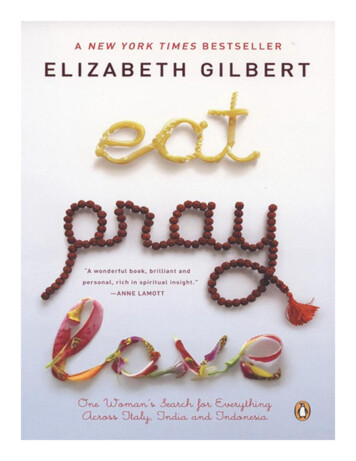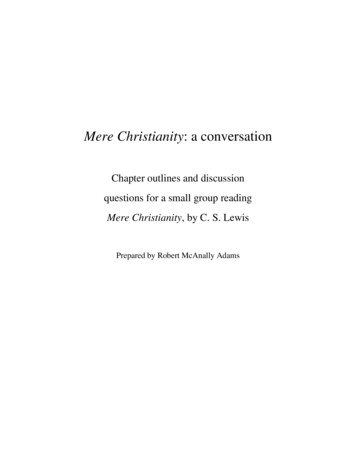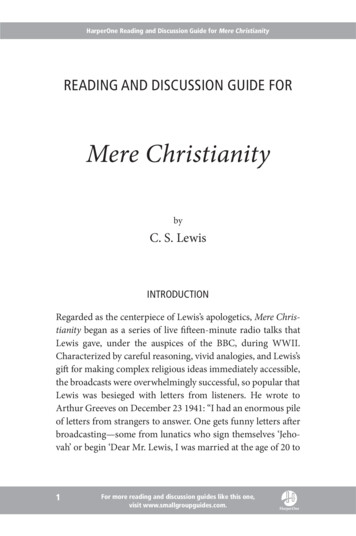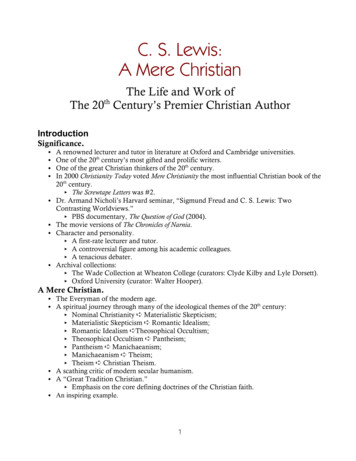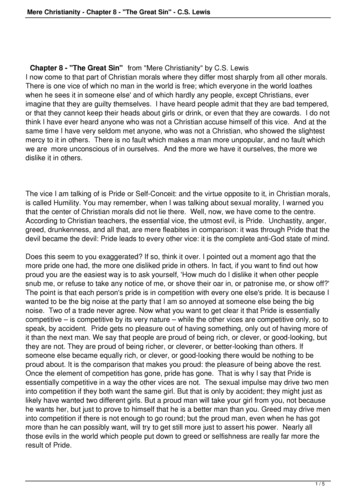
Transcription
Mere Christianity - Chapter 8 - "The Great Sin" - C.S. LewisChapter 8 - "The Great Sin" from "Mere Christianity" by C.S. LewisI now come to that part of Christian morals where they differ most sharply from all other morals.There is one vice of which no man in the world is free; which everyone in the world loatheswhen he sees it in someone else' and of which hardly any people, except Christians, everimagine that they are guilty themselves. I have heard people admit that they are bad tempered,or that they cannot keep their heads about girls or drink, or even that they are cowards. I do notthink I have ever heard anyone who was not a Christian accuse himself of this vice. And at thesame time I have very seldom met anyone, who was not a Christian, who showed the slightestmercy to it in others. There is no fault which makes a man more unpopular, and no fault whichwe are more unconscious of in ourselves. And the more we have it ourselves, the more wedislike it in others.The vice I am talking of is Pride or Self-Conceit: and the virtue opposite to it, in Christian morals,is called Humility. You may remember, when I was talking about sexual morality, I warned youthat the center of Christian morals did not lie there. Well, now, we have come to the centre.According to Christian teachers, the essential vice, the utmost evil, is Pride. Unchastity, anger,greed, drunkenness, and all that, are mere fleabites in comparison: it was through Pride that thedevil became the devil: Pride leads to every other vice: it is the complete anti-God state of mind.Does this seem to you exaggerated? If so, think it over. I pointed out a moment ago that themore pride one had, the more one disliked pride in others. In fact, if you want to find out howproud you are the easiest way is to ask yourself, 'How much do I dislike it when other peoplesnub me, or refuse to take any notice of me, or shove their oar in, or patronise me, or show off?'The point is that each person's pride is in competition with every one else's pride. It is because Iwanted to be the big noise at the party that I am so annoyed at someone else being the bignoise. Two of a trade never agree. Now what you want to get clear it that Pride is essentiallycompetitive – is competitive by its very nature – while the other vices are competitive only, so tospeak, by accident. Pride gets no pleasure out of having something, only out of having more ofit than the next man. We say that people are proud of being rich, or clever, or good-looking, butthey are not. They are proud of being richer, or cleverer, or better-looking than others. Ifsomeone else became equally rich, or clever, or good-looking there would be nothing to beproud about. It is the comparison that makes you proud: the pleasure of being above the rest.Once the element of competition has gone, pride has gone. That is why I say that Pride isessentially competitive in a way the other vices are not. The sexual impulse may drive two meninto competition if they both want the same girl. But that is only by accident; they might just aslikely have wanted two different girls. But a proud man will take your girl from you, not becausehe wants her, but just to prove to himself that he is a better man than you. Greed may drive meninto competition if there is not enough to go round; but the proud man, even when he has gotmore than he can possibly want, will try to get still more just to assert his power. Nearly allthose evils in the world which people put down to greed or selfishness are really far more theresult of Pride.1/5
Mere Christianity - Chapter 8 - "The Great Sin" - C.S. LewisTake it with money. Greed will certainly make a man want money, for the sake of a betterhouse, better holidays, better things to eat and drink. But only up to a point. What is it thatmakes a man with 10,000 a year anxious to get 20,000 a year? It is not the greed for morepleasure. 10,000 will give all the luxuries that any man can really enjoy. It is Pride—the wish tobe richer than some other rich man, and (still more) the wish for power. For, of course, power iswhat Pride really enjoys: there is nothing make a man feel so superior to others as being able tomove them about like toy soldiers. What makes a pretty girl spread misery wherever she goesby collecting admirers? Certainly not her sexual instinct: that kind of girl is quite often sexuallyfrigid. It is Pride. What is it that makes a political leader or a whole nation go on and on,demanding more and more? Pride again. Pride is competitive by its very nature: that is why itgoes on and on. If I am a proud man, then as long as there in one man in the whole world morepowerful, or richer or cleverer than I, he is my rival and my enemy.The Christians are right: it is Pride which has been the chief cause of misery in every nation andevery family since the world began. Other vices may sometimes bring people together: you mayfind good fellowship and jokes and friendliness among drunken people or unchaste people. Butpride always means enmity—it is enmity. And not only enmity between man and man, butenmity to God.In God you come up against something which is in every respect immeasurably superior toyourself. Unless you know God as that—and, therefore, know yourself as nothing incomparison—you do not know God at all. As long as you are proud you cannot know God. Aproud man is always looking down on things and people: and, of course, as long as you arelooking down, you cannot see something that is above you.That raises a terrible question. How is it that people who are quite obviously eaten up with Pridecan say they believe in God and appear to themselves very religious? I am afraid it means theyare worshiping an imaginary God. They theoretically admit themselves to be nothing in thepresence of this phantom God, but are really all the time imagining how He approves of themand thinks them far better than ordinary people: that is, they pay a pennyworth of imaginaryhumility to Him and get out of it a pound's worth of Pride towards their fellow-men. I suppose itwas of those people Christ was thinking when He said that some would preach about Him andcast out devils in His name, only to be told at the end of the world that He had never knownthem. And any of us may at any moment be in this death-trap. Luckily, we have a test.Whenever we find that our religious life is making us feel that we are good—above all, that weare better than someone else—I think we may be sure that we are being acted on, not by God,but by the devil. The real test of being in the presence of God is, that you either forget aboutyourself altogether or see yourself as a small, dirty object. It is better to forget about yourself2/5
Mere Christianity - Chapter 8 - "The Great Sin" - C.S. Lewisaltogether.It is a terrible thing that the worst of all the vices can smuggle itself into the very centre of ourreligious life. But you can see why. The other, and less bad, vices come from the devil workingon us through our animal nature. But this does not come through our animal nature at all. Itcomes direct from Hell. It is purely spiritual: consequently it is far more subtle and deadly. Forthe same reason, Pride can often be used to beat down the simpler vices. Teachers, in fact,often appeal to a boy's Pride, or, as they call it, his self-respect, to make him behave decently:many a man has overcome cowardice, or lust, or ill-temper, by learning to think that they arebeneath his dignity—that is, by Pride. The devil laughs. He is perfectly content to see youbecoming chaste and brave and self-controlled provided, all the time, he is setting up in you theDictatorship of Pride—just as he would be quite content to see your chilbains cured if he wasallowed, in return, to give you cancer. For Pride is spiritual cancer: it eats up the very possibilityof love, or contentment, or even common sense.Before leaving this subject I must guard against some possible misunderstandings:(1) Pleasure in being praised is not Pride. The child who is patted on the back for doing alesson well, the woman whose beauty is praised by her lover, the saved soul to whom Christsays, 'Well done,' are pleased and ought to be. For here the pleasure lies not in what you arebut in the fact that you have pleased someone you wanted (and rightly wanted) to please. Thetrouble begins when you pass from thinking, 'I have pleased him; all is well,' to thinking, 'What afine person I must be to have done it.' The more you delight in yourself and the less you delightin the praise, the worse you are becoming. When you delight wholly in yourself and do not careabout the praise at all, you have reached the bottom. That is why vanity, though it is the sort ofPride which shows most on the surface, is really the least bad and most pardonable sort. Thevain person wants praise, applause, admiration, too much and is always angling for it. It is afault, but a child-like and even (in an odd way) a humble fault. It shows that you are not yetcompletely contented with your own admiration. You value other people enough to want them tolook at you. You are, in fact, still human. The real black, diabolical Pride, comes when you lookdown on others so much that you do not care what they think of you. Of course, it is very right,and often our duty, not to care what people think of us, if we do so for the right reason; namely,because we care so incomparably more what God thinks. But the Proud man has a differentreason for not caring. He says 'Why should I care for the applause of that rabble as if theiropinion were worth anything? And even if their opinions were of value, am I the sort of man toblush with pleasure at a compliment like some chit of a girl at her first dance? No, I am anintegrated, adult personality. All I have done has been done to satisfy my own ideals—or myartistic conscience—or the traditions of my family—or, in a word, because I'm That Kind ofChap. If the mob like it, let them. They're nothing to me.' In this way real thorough-going pridemay act as a check on vanity; for, as I said a moment ago, the devil loves 'curing' a small fault3/5
Mere Christianity - Chapter 8 - "The Great Sin" - C.S. Lewisby giving you a great one. We must try not to be vain, but we must never call in our Pride tocure our vanity.(2) We say in English that a man is 'proud' of his son, or his father, or his school, or regiment,and it may be asked whether 'pride' in this sense is a sin. I think it depends on what, exactly, wemean by 'proud of'. Very often, in such sentences, the phrase 'is proud of' means 'has awarm-hearted admiration for'. Such an admiration is, of course, very far from being a sin. But itmight, perhaps, mean that the person is question gives himself airs on the ground of hisdistinguished father, or because he belongs to a famous regiment. This would, clearly, be afault; but even then, it would be better than being proud simply of himself. To love and admireanything outside yourself is to take one step away from utter spiritual ruin; though we shall notbe well so long as we love and admire anything more than we love and admire God.(3) We must not think Pride is something God forbids because He is offended at it, or thatHumility is something He demands as due to His own dignity—as if God Himself was proud. Heis not in the least worried about His dignity. The point is, He wants you to know Him: wants togive you Himself. And He and you are two things of such a kind that if you really get into anykind of touch with Him you will, in fact, be humble—delightedly humble, feeling the infinite reliefof having for once got rid of all the silly nonsense about your own dignity which has made yourestless and unhappy all your life. He is trying to make you humble in order to make thismoment possible: trying to take off a lot of silly, ugly, fancy-dress in which we have all gotourselves up and are strutting about like the little idiots we are. I wish I had got a bit further withhumility myself: if I had, I could probably tell you more about the relief, the comfort, of taking thefancy-dress off—getting rid of the false self, with all its 'Look at me' and 'Aren't I a good boy?'and all its posing and posturing. To get even near it, even for a moment, is like a drink of coldwater to a man in a desert.(4) Do not imagine that if you meet a really humble man he will be what most people call'humble' nowadays: he will not be a sort of greasy, smarmy person, who is always telling youthat, of course, he is nobody. Probably, all you will think about him is that he seemed a cheerful,intelligent chap who took a real interest in what you said to him. If you do dislike him it will bebecause you feel a little envious of anyone who seems to enjoy life so easily. He will not bethinking about humility: he will not be thinking about himself at all.If anyone would like to acquire humility, I can, I think, tell him the first step. The first step is torealise that one is proud. And a biggish step, too. At least, nothing whatever can be donebefore it. If you think you are not conceited, it means you are very conceited indeed.4/5
Mere Christianity - Chapter 8 - "The Great Sin" - C.S. Lewis5/5
Mere Christianity - Chapter 8 - "The Great Sin" - C.S. Lewis Take it with money. Greed will certainly make a man want money, for the sake of a better house, better holidays, better things to eat and drink. But only up to a point. What is it that makes a man with 10,000 a year anxious to get 20,000 a year? It is not the greed for more



